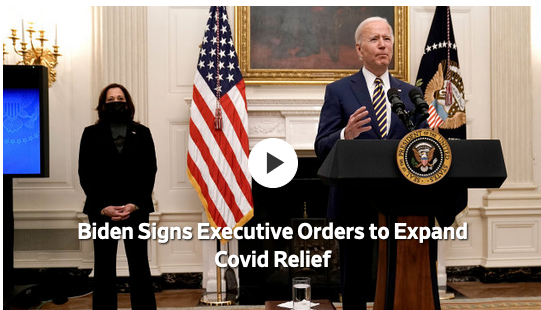In the News – January 27
By The Policy Circle Team
The Latest News The Policy Circle Team is Reading
We’ve gathered articles, videos, and analysis to dive-deeper into timely topics about the policy issues and opportunities that impact us all. Explore below and if you have additional news you think we should share, send us an email.
Biden’s Executive Orders
We mentioned last week that on President Biden’s first day in office, he signed more Executive Orders (EO) than his four predecessors combined. That number had now climbed to 37. Here’s some of what Biden has checked off in his first week as president:
- Announced plans to purchase 200 million more coronavirus vaccines
- Imposed COVID travel restrictions for non-U.S. citizens from the U.K., Ireland, South Africa and much of Europe.
- Issued a mandate requiring mask-wearing on federal property, on many airplanes, trains and intercity bus routes.
- Invoked the Defense Production Act to require private businesses to manufacture vaccines as well as testing protective equipment.
- “Buy American” push to make it harder to sell foreign-made goods to the government.
- Extended $400-a-week federal unemployment insurance benefit through September.
- Extended the temporary pause on federal student-loan payments through September.
Americans often hear about executive orders in media coverage of national politics these days, especially when the president and Congress disagree on policy. But what exactly is an executive order? Why are they important? And how do they impact States?
An executive order is an “official document the President of the United States creates to establish policies and manage the operations of the federal government. Executive orders are like laws, and can be reversed by the courts and Congress.”
Every President since George Washington has used the executive order power in various ways. John Adams issued the fewest (only 1), while President Franklin D. Roosevelt issued a whopping 3,721, according to this list. In recent years, Presidents Trump, Obama and Bush issued a variety of EOs, allowing each to push through policy changes without going through Congress. While an executive order can have the same effect as federal law under certain circumstances, Congress can pass a new law to override an executive order, subject to a presidential veto.
The States’ reaction to EOs varies, with some states suing the federal government over the orders. Last week after President Biden signed an EO to pause deportations for 100 days, the State of Texas filed a lawsuit, citing the moratorium violates an agreement signed with the Trump administration on immigration policy changes.
Need a refresher on federal vs. state right? Dive deeper into Federalism here and in our Policy Circle Briefs on Government Regulation and the U.S. Constitution.
In Other Administration Transition News…
Janet Yellen, the U.S. Treasury Secretary, is the first woman to hold the nation’s most powerful economic position. Watch her swearing-in ceremony. Yellen joins a number of other Administration officials who have recently been confirmed including Secretary of State Antony Blinke, Secretary of Defense Retired Gen. Lloyd Austin and Director of National Intelligence Avril haines. See the running list of nominees and those awaiting confirmation.
Speaking of transitions: Senator Bernie Sanders hasn’t just been in the news for his inauguration mittens, Sanders is now officially the Chairman of the Senate Budget Committee. Here’s what that means:
- The Committee, along with the House Budget Committee, is responsible for drafting Congress’ annual budget plan, as well as monitoring action on the budget for the federal government.
- Sen. Sanders, arguably the most progressive senator in the U.S. Senate, will shape and direct the Democrats’ tax and spending plans in Congress.
- Sen. Sanders has promised to use the reconciliation process as a means to “protect working families, the sick, the elderly, the disabled and the poor.”
- The reconciliation process allows for expedited consideration of certain tax, spending, and debt limit legislation, and aren’t subject to filibuster, which makes enacting budget and tax measure easier.
See stories below on the reconciliation process and the filibuster and explore the role of the U.S. Senate and its committees in our Policy Circle Brief.
Other News

The Current Debate Over the Filibuster.
How does it benefit one political party more than the other?
Learn what a filibuster is and how they’ve been used historically by reading the Policy Circle Senate Brief.

Democrats See Path to Biden’s Covid-19 Relief Bill Without GOP Help
Republican opposition to $1.9 trillion proposal could lead to a process called budget reconciliation, which limits a bill to tax and spending measures and requires a simple majority to pass rather than work towards bipartisan support.

These tax hikes will happen ‘for sure’ under Biden administration
“Capital gain and corporate taxes are going to be higher; and discussions about higher wealth tax are also appropriate.”
Learn more about taxes in this Policy Circle Brief.

How to Get a Covid-19 Vaccine: a State-by-State Guide
Each state is rolling out the vaccine differently. Some are allowing residents to pre-register and others coordinating via employer or local health department.
Learn more about what is the role of the local vs. federal government in crisis.

Reddit and Elon Musk sparked a GameStop stock surge.
Reddit stock trading chat community pushed up shares in the struggling game retailer GameStop to nearly three times its average.
Something to think about: Should there be increased regulations on social media and artifically stimulating the economy? Learn more about regulations in our Policy Circle Brief.
The Policy Circle is a 501(c)(3), nonpartisan organization that provides pathways for women to become courageous, knowledgeable and active citizens who identify and take ownership of local solutions to the issues facing their communities. Please consider supporting our mission and developing your own leadership skills by becoming a financial supporter.
Want to share your Policy Circle story? Email us at communications@thepolicycircle.org to learn how to get involved. And follow us on social: Facebook, Instagram, Twitter and LinkedIn.